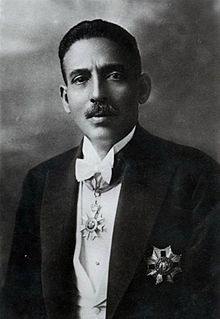Abd al-Muhsin as-Sa'dun
| Abd al-Muhsin Al-Saadoon | |
|---|---|
 |
|
| 2nd Prime Minister of Iraq | |
|
In office 20 November 1922 – 22 November 1923 |
|
| Monarch | Faisal I |
| Preceded by | Abd Al-Rahman Al-Gillani |
| Succeeded by | Jafar al-Askari |
|
In office 26 June 1925 – 21 November 1926 |
|
| Monarch | Faisal I |
| Preceded by | Yasin al-Hashimi |
| Succeeded by | Jafar al-Askari |
|
In office 11 January 1928 – 28 April 1929 |
|
| Monarch | Faisal I |
| Preceded by | Jafar al-Askari |
| Succeeded by | Tawfiq al-Suwaidi |
|
In office 19 September 1929 – 13 November 1929 |
|
| Monarch | Faisal I |
| Preceded by | Tawfiq al-Suwaidi |
| Succeeded by | Naji al-Suwaydi |
| Personal details | |
| Born |
Abd Al-Muhsin bin Fahad Al-Sa'dun 1879 Nasiriyah, Basra Vilayet |
| Died | 13 November 1929 Baghdad, Iraq |
| Political party | Progress Party |
| Children | Wasif Ali Aida Necla |
| Alma mater | Ottoman Military Academy |
| Religion | Sunni Islam |
| Military service | |
| Allegiance |
|
| Service/branch | Ottoman Army |
| Years of service | Unknown-1909 |
| Rank |
Binbashi (1905-1909) Second Lieutenant (1909) |
| Unit | Infantry |
ʻAbd al-Muḥsin Saʻdūn or Abd al-Muhsin Al-Saadoon, Honorary KCMG (Arabic: عبد المحسن السعدون) (1879 – November 13, 1929) was an Iraqi politician who served as Prime Minister of Iraq on four separate occasions between 1922 and 1929.
Abd al-Muhsin as-Sa'dun hailed from a family descended from the most powerful tribe within the Muntafiq Confederation (the Sa'duns). In the mid-nineteenth century the Ottoman fostered rivalries between the dominant Sa'dun chiefs by offering enticing land deals to the highest bidders among them, pursuant to a policy of tribal weakening and division. In 1871 Midhat Pasha finally rent the family in two between "Ottomanizers" and their opponents by offering some chiefs permanent ownership of once communal tribal lands (previously they could only exact tribute from cultivators therein). The chiefs then grew very wealthy by converting the rest of the tribe into mere tenants for their exploitation.
Great Britain took Iraq from the Ottomans following World War I, and pursued a policy whereby they lavished political and economic favors on tribal leaders in order to encourage them to exert their influence in ways conducive to British economic designs in the country. as-Sa'dun was one of many to consistently obtain seats in Parliament in exchange for this service. Notably, however, while many tribal leaders at the time were provincial in outlook, as-Sa'dun was distinguished both on account of being a sayyid (one claiming descent from the Prophet Muhammad), and, more importantly, having broadened his horizons at the Military Academy in Istanbul. As-Sa'dun served as a military officer during Ottoman control of the country, as an aide-de-camp to Sultan Abd-ul-Hamid II, and as a ten-year member of the Ottoman Parliament. Afterward he returned to Iraq and embarked on a career in politics as a formidable politician.
as-Sa'dun was a shrewd politician with many tribal and British connections (as evinced by his control of the Parliament alliance the Progressives). This made him one of Faisal I of Iraq's bitterest rivals, as he frequently acted as an instrument of British supremacy over the Iraqi interests Faisal was trying to pursue. As premier in 1923 he cracked down on a movement calling for a boycott of elections for the Constituent Assembly. Then in 1926 he assured the smooth passage of the Second Ango-Iraqi Treaty despite its inclusion of an unequal twenty-five year Financial and Military Agreement between Iraq and Britain.
...
Wikipedia
